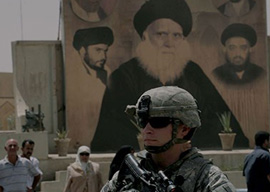
January 03, 2013

As a Jew, Paul gets it from all sides. Other members of the Old Right, naturally angry and bitter at American conservatism’s hijacking by (mostly) Jewish ex-Marxists in the 1980s, find it hard to trust him. I once mentioned Paul’s name to a neocon Gentile, who responded: “Gottfried? He’s the house Jew of the Buchananites.” YHWH only knows what frankly leftist Jews such as Jonathan Kozol think of him.
Paul keeps his composure in the face of all this obloquy. In his 1996 essay “On “Being Jewish”,” he remembers with mild scorn the “boorish, resentful Jews” he knew in graduate school at Yale who “yammered constantly about their exclusion (from what?).” From what, indeed: This was the graduate school at Yale University.
Taking issue with Larry Auster’s call for a Jewish-Christian united front against Islam, the common enemy, Paul notes that Jews have historically been more favorably disposed to Islam than to Christianity. He is skeptical of the usual explanation: “Jewish distaste for Christianity is so deep-seated that it cannot be written off as a legacy of Christian anti-Semitism.”
Even in the brotherhood of the New Universal Faith the old division persists:
Jewish and white [sic] Christian liberals are not interchangeable. They become liberals in response to different social and psychological needs. Jews are inclined to be multiculturalists because they fear and distrust a Christian majority. White Christians…chase after “diversity” because they are self-dismissively throwing away their civilization.
Elsewhere Paul takes on “the virulent hostility toward Israel that now characterizes elements of the humiliated American Old Right.” He regrets that hostility. While he allows that there are blots on Israel’s record, he points to the implacable nature of Israel’s enemies, their openly genocidal intentions, and Israel’s very limited geopolitical options. But then, in an admirable display of honest reflection, he wonders whether he would reason this way about Israel if he were not Jewish: “The answer is probably not….”
To balance out the polemic and the intellectual history, Paul adds a personal touch: an affecting account of his father, a vigorous and worthy man worn down at last by old age, drink, and deafness, until one day…
Well, read the essay (“A Man in Full”) for yourself. Then read the rest of War and Democracy. It’s a beautiful book.